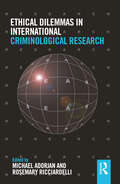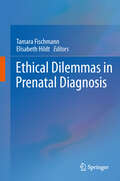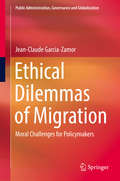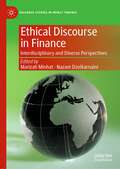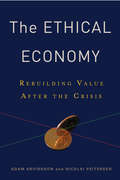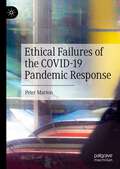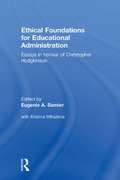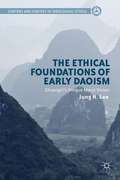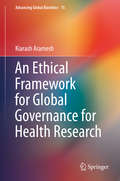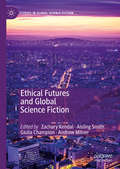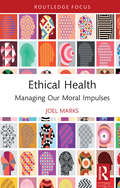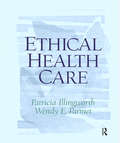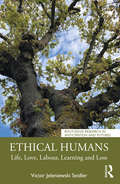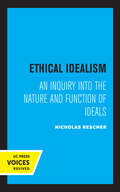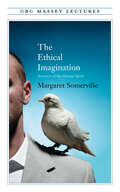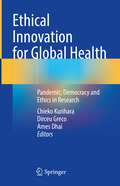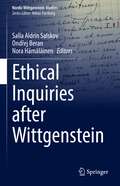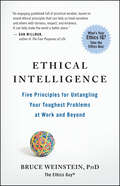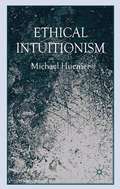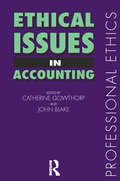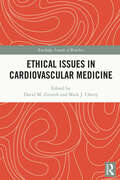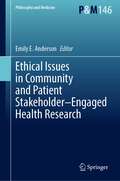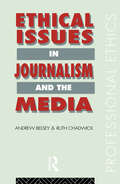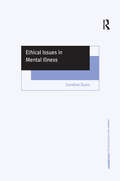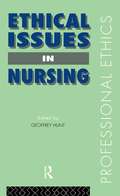- Table View
- List View
Ethical Dilemmas in International Criminological Research (Routledge Advances in Criminology)
by Michael Adorjan Rosemary RicciardelliBuilding on the editors’ previous publication, Engaging with Ethics in International Criminological Research, this new book brings together a fresh collection of leading international scholars tackling ethical dilemmas in criminological research. Contributors address how they have experienced and addressed ethical issues in their research, and how they have balanced the benefits and harms of doing such research for both the researcher and the researched. Ethical Dilemmas in International Criminological Research draws on various issues across a range of jurisdictions and political and social contexts, including cybercrime and transgressive online actions; state and police responses to crime; the war on drugs; working with traumatised participants in criminological research; punishment and prison; and sex, sexualities, and gender. Moreover, this collection aims to offer a truly international perspective, including insights from research projects in the Global South. This book is essential reading for junior scholars just starting out with original research, as well as more seasoned researchers looking to gain insights into the challenges of criminological research in other cultural contexts. It is also instructive reading for students taking courses in criminological and social research methods.
Ethical Dilemmas in Prenatal Diagnosis
by Elisabeth Hildt Tamara FischmannTechnological developments in the life sciences confront us with new facets of a Faustian seduction. Are we "playing God" more and more, as claimed by critical authors of modernity? Achievements in genetic research produce ethical dilemmas which need to be the subject of reflection and debate in modern societies. Denial of ambivalences that ethical dilemmas arouse constitutes a threat to societies as well as to individuals. The book presents a compilation of some of the results of the interdisciplinary European study "Ethical Dilemmas Due to Prenatal and Genetic Diagnostics" (EDIG), which investigated some of these dilemmas in detail in a field which is particularly challenging: prenatal diagnosis. When results from prenatal diagnosis show fetal abnormalities, women and their partners are confronted with ethical dilemmas regarding: the right to know and the right not to know; decision-making about the remainder of the pregnancy and the desire for a healthy child; responsibility for the unborn child, for its well-being and possible suffering; life and death. This book provides answers from an ethical, psychoanalytical and medical viewpoint.
Ethical Dilemmas of Migration: Moral Challenges For Policymakers (Public Administration, Governance And Globalization Ser. #5)
by Jean-Claude Garcia-ZamorThis book discusses the ethical dilemmas of migration in the era of globalization. Centered on the recent influx of large numbers of migrants and refugees to the United States and Europe and viewed through the lens of the 2016 World Humanitarian Summit and the United Nations Summit on Refugees and Migrants, this book focuses on the problems posed by globalized migration and analyzes proposed responses. Using prominent ethical theories and moral principles, such as Utilitarianism, duty, justice, and integrity, the book proposes a framework for analyzing decision-making by migrants and policymakers and formulating equitable policies to address the migration crisis. Drawing attention to the ethical dilemmas that migrants and policymakers experience, this book fills a gap in the literature and enriches it, adding to the economic, political, and human rights issues that are traditionally part of the migration discussion. Appropriate for students and scholars of ethics, policy, and political science, this book is also meant to be of use to practitioners and decision-makers faced with similar decisions.
Ethical Discourse in Finance: Interdisciplinary and Diverse Perspectives (Palgrave Studies in Impact Finance)
by Marizah Minhat Nazam DzolkarnainiEthical discourse is commonly not a priority in a conventional finance syllabus. Moral sentiments often take a back seat to market sentiments, even in shaping the direction of ethical finance business. This anomaly persists despite growing interest in ethical finance. Taking an interdisciplinary and diverse perspective, this book enriches the evolving definition and scope of ethical finance literature by focusing on actors, products and regulation that shape markets. Considering the gap between theory and practice, this book bridges academic and professional knowledge in unpacking ethical and governance issues in the financial industry. In an effort to include as many viewpoints as possible, regardless of popularity or who holds them, the book editors gathered thoughts from diverse fields, including accounting, economics, ethics, finance, governance, law, management, philosophy and religion. Appealing to academic and non-academic stakeholders with an interest in ethics and finance, this book is the result of and a testament to a distinct educational and public engagement project that included different generations and communities, for future reference.
The Ethical Economy: Rebuilding Value After the Crisis
by Adam Arvidsson Nicolai PeitersenA more ethical economic system is now possible, one that rectifies the crisis spots of our current downturn while balancing the injustices of extreme poverty and wealth. Adam Arvidsson and Nicolai Peitersen, a scholar and an entrepreneur, outline the shape such an economy might take, identifying its origins in innovations already existent in our production, valuation, and distribution systems.Much like nineteenth-century entrepreneurs, philosophers, bankers, artisans, and social organizers who planned a course for modern capitalism that was more economically efficient and ethically desirable, we now have a chance to construct new instruments, institutions, and infrastructure to reverse the trajectory of a quickly deteriorating economic environment. Considering a multitude of emerging phenomena, Arvidsson and Peitersen show wealth creation can be the result of a new kind of social production, and the motivation of continuous capital accumulation can exist in tandem with a new desire to maximize our social impact. Arvidsson and Peitersen argue that financial markets could become a central arena in which diverse ethical concerns are integrated into tangible economic valuations. They suggest that such a common standard has already emerged and that this process is linked to the spread of social media, making it possible to capture the sentiment of value to most people. They ultimately recommend how to build upon these developments to initiate a radical democratization of economic systems and the value decisions they generate.
Ethical Failures of the COVID-19 Pandemic Response
by Péter MartonThis book draws attention to the non-biological—political, economic, societal and cultural—variables shaping both the emergence and persistence of the COVID-19 pandemic and the global response to it, with a particular focus on political decisionmakers’ role in the domestic and international politics surrounding the process of the pandemic. The book identifies the strategic and underlying ethical failures of decision making, using a process-tracing approach to reconstruct considerations, decisions and actions by key leaders—interested in thus weaving a global narrative of the response. The author highlights key speech acts, and interprets the causal implications embedded in a chronological and contextualised appraisal of events, statements and public health measures. The book further discusses the normative ethics of pandemic response, and presents lessons drawn from the present experience. It also offers a normative analysis taking into consideration pre-pandemic guidelines for response, including in the literature of public health ethics and pandemic preparedness plans.
Ethical Foundations for Educational Administration: Essays In Honour Of Christopher Hodgkinson
by Eugenie A. Samier Kristina MihailovaChristopher Hodgkinson is one of the most important contributors to the field of educational administration. This collection of essays open up the philosophical foundations of ethical educational administration by reviewing his writings and exploring the ethical theories of major philosophers, as they apply to administration and leadership.Ethical Foundations of Educational Administration is published in honour of the work of Christopher Hodgkinson. It is divided into two sections. The first comprises biographical essays and a critical evaluation of Professor Hodgkinson's work, focusing on his personal and intellectual contributions to a moral theory of educational administration and leadership. The second section looks at how his moral philosophy can inform administrative practice. The work of a broad range of philosophers is discussed, from the pre-20th century theories of Aquinas, Adam Smith and Kant to the pragmatists Peirce, James and Dewey, Heidegger, MacIntyre, Bourdieu, Churchland and Thagard.Christopher Hodgkinson's definition of administration as 'philosophy-in-action' is now famous within the field. This collection illustrates the essential truth of that maxim, showing that moral philosophy, approached in the spirit promoted by Hodgkinson has both practical and critical purpose when brought to bear upon educational administration and leadership.
The Ethical Foundations of Early Daoism
by Jung H. LeeThe Ethical Foundations of Early Daoism: Zhuangzi's Unique Moral Vision argues that we can read early Daoist texts as works of moral philosophy that speak to perennial concerns about the well-lived life in the context of the Way. Lee argues that we can interpret early Daoism as an ethics of attunement.
An Ethical Framework for Global Governance for Health Research (Advancing Global Bioethics #15)
by Kiarash ArameshThis book provides a comprehensive description and ethical analysis of one of the most challenging areas: international health research. Furthermore, it provides a vivid portrait of the current situation of global governance for health research and its main challenges and suggests a comprehensive and universal ethical framework based on the existing theories and frameworks. This work is a must-read for all the students, scholars, professionals, activists, and policy-makers who are involved or interested in the global health research enterprise and its governance and ethics.
Ethical Futures and Global Science Fiction (Studies in Global Science Fiction)
by Zachary Kendal Aisling Smith Giulia Champion Andrew MilnerEthical Futures and Global Science Fiction explores the ethical concerns and dimensions of representations of the future of global science fiction, focusing on the issues that dominate utopian, dystopian and science fiction literature. The essays examine recent visions of the future in science fiction and re-examine earlier texts through contemporary lenses. Across fourteen chapters, the collection considers authors from Algeria, Australia, Canada, China, Egypt, France, Germany, Haiti, India, Jamaica, Macedonia, Mexico, Russia, South Africa, the UK and USA. The volume delves into a range of ethical questions of immediate contemporary relevance, including environmental ethics, postcolonial ethics, social justice, animal ethics and the ethics of alterity.
Ethical Health: Managing Our Moral Impulses (Routledge Focus on Philosophy)
by Joel MarksThis book argues that moralism is a troublesome emotion of the sort one might seek help with from a psychotherapist. Its focus is on how to disabuse ourselves of the illusion that our values are objective, as well as how to manage the manifestations of its residual presence.This thesis may seem odd at first blush because morality is commonly conceived as an antidote to our baser impulses. Desire makes us want to do something, but the voice of conscience urges us not to. If morality is conceived as a myth, as the author contends, then how shall we conduct our lives? The form of abolitionism put forward by the author goes beyond proposing the mere elimination of moral beliefs, attitudes, vocabulary, and institutions to encouraging their replacement by the rational vetting of our desires. He suggests that moralism, conceived as being motivated by belief in objective values, be treated similarly to, or even as, an emotional problem, akin to, or perhaps even identical to, the sort addressed by anger management programs in psychotherapy. By exposing our beliefs and desires to rational scrutiny, we can achieve our rational goals without the adverse side effects engendered by a fictitious moral overlay.Ethical Health will principally appeal to scholars and students working in meta-ethics and moral psychology and will also be of interest to clinical practitioners and inquiring laypersons.
Ethical Health Care
by Patricia IllingworthOffering a format that is significantly different than that offered by other books, Ethical Health Care beings by asking what is meant by health and how it is achieved. The book then proceeds to explore with care and context the nature of the relationship between patients and clinicians, health care providers and the societies in which they inhabit, and finally the relationship between the health care enterprise and the international community. By emphasizing the ethical issues that arise in the broad quest to foster human health, and appreciating that health is not primarily a function of medical interventions, Ethical Health Care introduces students to problems such as the international distribution of pharmaceuticals and the dangers of reemerging infections. To a far greater extent than is done traditionally, Ethical Health Care provides an interdisciplinary perspective to bioethics, relying heavily upon the teachings of economics, law, and public health.
Ethical Humans: Life, Love, Labour, Learning and Loss (Routledge Research in Anticipation and Futures)
by Victor Jeleniewski SeidlerEthical Humans questions how philosophy and social theory can help us to engage the everyday moral realities of living, working, loving, learning and dying in new capitalism. It introduces sociology as an art of living and as a formative tradition of embodied radical eco post-humanism. Seeking to embody traditions of philosophy and social theory in everyday ethics, this book validates emotions and feelings as sources of knowledge and shows how the denigration of women has gone hand in hand with the denigration of nature. It queries post-structuralist traditions of anti-humanism that, for all their insights into the fragmentation of identities, often sustain a distinction between nature and culture. The author argues that in a crisis of global warming, we have to learn to listen to our bodies as part of nature and draws on Wittgenstein to shape embodied forms of philosophy and social theory that questions theologies that tacitly continue to shape philosophical traditions. In acknowledging our own vulnerabilities, we question the vision of the autonomous and independent rational self that often remains within the terms of dominant white masculinities. This book offers different modes of self-work, drawing on psychoanalysis and embodied post-analytic psychotherapies as part of a decolonising practice questioning Eurocentric colonising modernity. In doing so it challenges, with Simone Weil, Roman notions of power and greatness that have shaped visions of white supremacy and European colonial power and empire. This book will be of great interest to students and scholars of environmental ethics, environmental philosophy, social theory and sociology, ethics and philosophy, cultural studies, future studies, gender studies, post-colonial studies, Marxism, psychoanalysis and psychotherapy and philosophy and sociology as arts of living.
Ethical Idealism
by Nicholas RescherThis title is part of UC Press's Voices Revived program, which commemorates University of California Press’s mission to seek out and cultivate the brightest minds and give them voice, reach, and impact. Drawing on a backlist dating to 1893, Voices Revived makes high-quality, peer-reviewed scholarship accessible once again using print-on-demand technology. This title was originally published in 1987.
The Ethical Imagination: Journeys of the Human Spirit (The CBC Massey Lectures)
by Margaret SomervilleScience and technology force us to ask some of the most challenging and unprecedented ethical questions in the world today. These issues encompass what it means to be human, how we relate to others and our world, and how we find meaning in life. How we can find a shared ethics for an interdependent world? In her 2006 CBC Massey Lectures, ethicist and McGill University professor Margaret Somerville tackles some of the most contentious issues of our times, and proposes a brilliant new kind of ethical language and thought to help us navigate them.
Ethical Innovation for Global Health: Pandemic, Democracy and Ethics in Research
by Chieko Kurihara Dirceu Greco Ames DhaiThis volume captures the recent changes and evolution in ethics in research involving humans and provides future directions to achieve alternative drug development strategies for equitable global health. It presents ethical considerations in current day clinical trials and new trends of ethics in research. It also describes the historical context, illustrates the process in alternative paradigms to achieve democracy after World War II, how the framework of ethics in research was established in different regions, and policies implemented to protect research participants from the exploitation of new drug development. The book is organized into three themed parts: relevant constructions from Brazil, South Africa, Taiwan, South Korea, and Japan; historical and international perspectives of principles of ethics in research; and alternative frameworks of clinical development and innovation. Ethical Innovation for Global Health: Pandemic, Democracy and Ethics in Research is an informative resource for academic researchers, the global pharmaceutical industry, regulators, civil society and other role players involved in global health. It is contributed to by leaders in global policy development in research ethics, and experts in drug development activities with its trajectory being global health. The COVID-19 pandemic, as a global disaster, necessitated not only socio-economic but also cultural transformation. While effective vaccines were developed under a successful new methodology, there remains inequity of distribution of these vaccines globally. The book re-engages with the notion of the primacy of distributing results of scientific innovation to those who most require the benefits.
Ethical Inquiries after Wittgenstein (Nordic Wittgenstein Studies #8)
by Salla Aldrin Salskov Ondřej Beran Nora HämäläinenThis volume showcases contemporary, ground-up ethical essays in the tradition of Wittgenstein’s broader philosophy and Wittgenstein-inspired ethical reflection. It takes the ethical relevance of Wittgenstein as a substantial and solid starting point for a broad range of ongoing thinking about contemporary ethical issues.The texts are organised in two sections. The first consists of chapters exploring questions around what could be called the “grammar” of our moral forms of life, and thus represents a more traditional approach in ethics after Wittgenstein. The second part represents a recent turn in the tradition towards investigating moral conceptions, perspectives and concepts that are undergoing change, either because the world itself is changing (for instance with new technologies) or because human agency, such as social movements, has brought us to reconsider previously unquestioned ideas and structures.Within the book, the authors’ contributions are inspired, in their ways of working with ethical questions, by Wittgenstein’s conceptions of language, understanding and the nature of philosophical inquiry. This book is of interest to philosophers influenced by Wittgenstein, as well as to all ethicists seeking ideas for how to do philosophy in a manner close to lived experience and practice.
Ethical Intelligence: Five Principles for Untangling Your Toughest Problems at Work and Beyond
by Bruce WeinsteinEthical intelligence may not get as much attention as other forms of “smarts,” but as Bruce Weinstein shows, it is the most practical, valuable, and even courageous form, determining success on the job, ful?llment in relationships, and sense of self-worth. After reviewing the ?ve basic ethical principles agreed upon by cultures and religious traditions around the world and throughout time, Weinstein shows readers how to develop their ethics IQ by applying these principles in daily life. Real-world examples and interviews — with CEOs, athletes, celebrities, and political leaders — illustrate ethics in action, and their absence. Most strikingly, Weinstein shows that ethical principles aren’t just good; they are good for us, bene?ting our health, happiness, and prosperity. While ethical ignorance grabs headlines, it is ethical intelligence that creates the most ful?lling life.
Ethical Intuitionism
by Michael HuemerA defence of ethical intuitionism where (i) there are objective moral truths; (ii) we know these through an immediate, intellectual awareness, or 'intuition'; and (iii) knowing them gives us reasons to act independent of our desires. The author rebuts the major objections to this theory and shows the difficulties in alternative theories of ethics.
Ethical Issues in Accounting (Professional Ethics)
by John Blake Catherine GowthorpeEthical Issues in Accounting offers a comprehensive and accessible introduction for students and teachers of business studies and accountancy as well as the practicing accountant. The book covers the ethical implications of several aspects of accounting: * ethics and taxation * creative accounting * ethics in accounting regulation * ethical dilemmas in the public sector * whistleblowing * various aspects of social accounting, including environmental accounting. The fitness of the accounting profession as guardians of accounting and auditing ethics is also discussed in detail.
Ethical Issues in Cardiovascular Medicine (Routledge Annals of Bioethics)
by David M. Zientek Mark J. CherryThis book provides an exploration of the ethics of cardiology practice. It provides a variety of frameworks for analyzing ethical issues that arise in cardiovascular medicine. Cardiovascular medicine—the diagnosis and treatment of congenital and acquired diseases of the heart, major arteries, and veins—has seen rapid change in diagnosis, treatment, and the organization of practice in the last half of the twentieth and the beginning of the twenty first century. The complexity of these developments has resulted in increasing subspecialization, and many practitioners are challenged to stay abreast with the latest developments in cardiology. These changes also bring with them various ethical challenges. The chapters in this volume are divided by five broad areas of practice: beginning-of-life, end-of-life, transplantation and allocation of expensive or scarce resources, professionalism, and research. The case-based approach presented across the volume provides a perspective that will allow readers to reason through current and future ethical issues as they arise in this rapidly changing field. Ethical Issues in Cardiovascular Medicine will be of interest to researchers working in bioethics, clinical ethics, and the philosophy of medicine, as well as practicing physicians, nurses, and students who work in cardiovascular medicine.
Ethical Issues in Community and Patient Stakeholder–Engaged Health Research (Philosophy and Medicine #146)
by Emily E. AndersonThis book provides in-depth analyses of a wide range of topics surrounding ethical issues in community and patient stakeholder–engaged health research, and highlights where consensus exists, is emerging, or remains elusive. Topics in this book cover the history of stakeholder engagement in health research; how codes of ethics and regulations have (or have not) addressed stakeholder engagement; how to promote equitable collaboration; the ethical perspectives of different stakeholders; and the unique challenges posed by stakeholder- engaged research to the protection of human research participants and the research ethics review process. The book includes discussion of unique issues that arise in stakeholder engagement relevant to different populations, settings, and research designs. This book is relevant for anyone with a role or interest in stakeholder-engaged research, including patient and community research partners; academic researchers; research ethics scholars and educators; and funders.
Ethical Issues in Journalism and the Media (Professional Ethics)
by Ruth Chadwick Andrew BelseyThis book examines the ethical concepts which lie at the heart of journalism, including freedom, democracy, truth, objectivity, honesty and privacy. The common concern of the authors is to promote ethical conduct in the practice of journalism, as well as the quality of the information that readers and audience receive from the media.
Ethical Issues in Mental Illness (Ashgate New Critical Thinking in Philosophy)
by Caroline DunnThis book is an attempt to address the ethical issues raised by mental illness and its treatment by focusing on the question of autonomy. The mentally ill may be regarded as non-autonomous by virtue of irrationality, which may result in treatment models which deny them a voice. As a counter to this, some have moved to the other extreme and argued that the mentally ill must be regarded as fully autonomous in all circumstances, and consequently that all their wishes regarding treatment must be respected. This book examines the ethical consequences of such simplistic approaches towards autonomy and mental illness, and considers the ethical issues raised by specific forms of treatment. It is suggested in conclusion that improvement in the care and treatment of the mentally ill requires not only a fundamental change in social attitudes but also a less impoverished conception of autonomy than some of those currently employed.
Ethical Issues in Nursing (Professional Ethics)
by Dr Geoffrey Hunt Geoffrey HuntThis is the first book to take nursing ethics beyond stock 'moral concepts' to a critical examination of the fundamental assumptions underlying the very nature of nursing. It takes as its point of departure the difficulties nurses experience practising within the confines of a bioethical model of health and illness and a hierarchical, technocratic health care system. The contributors go on to deal openly and honestly with controversial issues faced by nurses, such as euthanasia and HIV.
